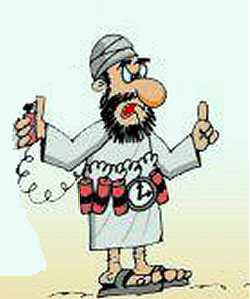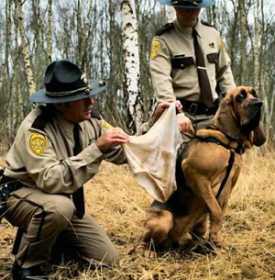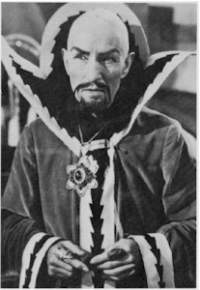Hardcore militants who seized Pakistan's most scenic valley are still holed up in its snowy heights, three months after President Pervez Musharraf sent in the army to show his resolve against spreading Islamic extremism.
Down below, life in the towns that dot the Swat Valley has returned to something approaching normality. But bombings persist and Mullah Fazlullah, the firebrand cleric behind last year's Taliban-style uprising, remains at large.
Earlier Pakistani security forces have arrested more than 440 Islamic "terrorists", including 60 would-be suicide bombers, in the last three months, the interior ministry said on Tuesday.
The announcement comes amid a wave of violence blamed on al-Qaeda and the Taliban, including a suicide bombing near the Pakistani military headquarters on Monday that killed the army's surgeon general. "Law enforcement and intelligence agencies have arrested 442 terrorists and militants during the past three months," interior ministry spokesman Brigadier Javed Cheema told reporters. Large quantities of explosives, weapons, suicide jackets and hand grenades were seized from the suspects, Cheema said.
In November, the army launched one of its biggest operations since Pakistan threw its support behind the US-led war against terrorism six years ago. On Monday, the military ferried journalists by helicopter to three mountaintop positions to show the territory its more than 10,000-strong force has retaken. "About 90 percent of the area has been cleared of the (militants), and only about 10 percent, pockets of resistance, are remaining," said army spokesman Maj Gen Athar Abbas. "They have taken to the heights. Hopefully those areas will be taken back soon."
 Fazlullah leads a banned extremist group that sent reinforcements for the Taliban when US forces invaded Afghanistan in 2001. In Swat, he used his own FM radio station to preach a harsh brand of Islam and won a large local following by pressing for the introduction of Islamic law in the poorly policed region. He took up arms in July, calling for holy war against the government, and used his thousands of followers to seize a string of towns, scattering outgunned police and erecting "Taliban station" signboards outside former police stations. Fazlullah leads a banned extremist group that sent reinforcements for the Taliban when US forces invaded Afghanistan in 2001. In Swat, he used his own FM radio station to preach a harsh brand of Islam and won a large local following by pressing for the introduction of Islamic law in the poorly policed region. He took up arms in July, calling for holy war against the government, and used his thousands of followers to seize a string of towns, scattering outgunned police and erecting "Taliban station" signboards outside former police stations.
The militant takeover was a shocking reflection of how Musharraf's government had lost control of tracts of the conservative northwest. Swat, formerly known as a tourist retreat and dubbed the "Switzerland of Asia" for its glorious Alpine scenery, became a no-go zone. Officials accused Fazlullah's long-haired, bearded followers of imposing a reign of terror, shuttering schools for girls and beheading locals who opposed them. They suspect that the militants, apparently supported by some foreign fighters with suspected links to al-Qaeda, were positioning themselves to block the Karakorum Highway that links Pakistan and China.
Maj. Gen. Nasser Janjua, commander of the military operation, said troops backed by helicopter gunships and artillery took control of key militant positions and chased the fleeing fighters, mostly locals. He claimed that some shaved their beards and were nabbed as they tried to escape. At one mosque, troops found concealed in the ceiling a horde of chemicals, explosives and other equipment for making bombs. Elsewhere, they found and destroyed a jeep packed with explosives, apparently primed for a suicide attack.
In all, the operation has left at least 11 soldiers, 19 civilians and about 230 militants dead, Janjua said. But he said the army had had little success in tracking the militant leaders, including Fazlullah, thought to be hiding somewhere in Swat or a tribal region bordering Afghanistan.
While residents, at least in the valley's main town of Mingora, say they now feel more secure, the threat of attack persists. Janjua said a nighttime curfew was still necessary because of fears of targeted killings by militants of government supporters.
At Uchrai Sar, where a 600-strong army deployment is based on a spectacular mountain ridge at the northwestern end of the Swat Valley, machine-gunners sit in dry stone bunkers scattered amid the pine forest. The camp lies near two of the four remaining "hotspots" in the valley, Beha and Piochar, where a hardcore of a few dozen militants are believed to have fled after they were dislodged in early January.
Battalion commander, Lt Col Nadir Hussain, said there had been no major attacks on security forces for the past two months in the area, and elections here passed off peacefully last week. But in a reminder of the continuing threat, he pointed to a mountainside where a roadside bomb hit a wedding party just a mile away on Friday, killing 12 people.
At another key mountaintop position, Shangla, the local police chief recalled how in November, his 250 officers had escaped their 10 posts in the district for fear they would be "captured and slaughtered" by Fazlullah's men. "The militants came in the hundreds. It was impossible for 20 men to defend the posts and the public," Mohammed Iqbal said. "We are trained for fighting crime, not guerrilla war and insurgency."
The police force has been doubled and given new equipment but officials say the battle against Fazlullah can only be won if his fighters can find neither sanctuary nor recruits among locals. The army relies on villagers for intelligence. The locals "have not started fighting (the militants) yet, but at least they have started resenting them, telling them, 'Please go away,'" Janjua said. |
 LAHORE, Pakistan - Two suicide bombers blew themselves up at a prestigious naval college in the eastern Pakistani city of Lahore on Tuesday, killing at least five people and injuring 19, officials said. The blasts sent thick black smoke billowing over the college and scattered debris and human remains at the scene, which is just off the citys historic Mall Road. Two buses and several cars caught fire afterwards.
LAHORE, Pakistan - Two suicide bombers blew themselves up at a prestigious naval college in the eastern Pakistani city of Lahore on Tuesday, killing at least five people and injuring 19, officials said. The blasts sent thick black smoke billowing over the college and scattered debris and human remains at the scene, which is just off the citys historic Mall Road. Two buses and several cars caught fire afterwards.
 Fazlullah leads a banned extremist group that sent reinforcements for the Taliban when US forces invaded Afghanistan in 2001. In Swat, he used his own FM radio station to preach a harsh brand of Islam and won a large local following by pressing for the introduction of Islamic law in the poorly policed region. He took up arms in July, calling for holy war against the government, and used his thousands of followers to seize a string of towns, scattering outgunned police and erecting "Taliban station" signboards outside former police stations.
Fazlullah leads a banned extremist group that sent reinforcements for the Taliban when US forces invaded Afghanistan in 2001. In Swat, he used his own FM radio station to preach a harsh brand of Islam and won a large local following by pressing for the introduction of Islamic law in the poorly policed region. He took up arms in July, calling for holy war against the government, and used his thousands of followers to seize a string of towns, scattering outgunned police and erecting "Taliban station" signboards outside former police stations. A remote-controlled bomb ripped through a wedding party convoy on Friday, killing 14 people and wounding 13 others in the Matta tehsil of Swat district, hospital and police sources said. The bomb, which detonated in the Ronial Takh Maira area of the region, exploded around 4pm when the wedding party was travelling from Kandogai village to Pir Dar Baba village. The bride, four children aged between five and 12 years, and four bystanders died instantly. The injured, mostly children, were shifted to Saidu Sharif Hospital as well as a private hospital in Matta tehsil. Hospital sources said most of the injured were in critical condition.
A remote-controlled bomb ripped through a wedding party convoy on Friday, killing 14 people and wounding 13 others in the Matta tehsil of Swat district, hospital and police sources said. The bomb, which detonated in the Ronial Takh Maira area of the region, exploded around 4pm when the wedding party was travelling from Kandogai village to Pir Dar Baba village. The bride, four children aged between five and 12 years, and four bystanders died instantly. The injured, mostly children, were shifted to Saidu Sharif Hospital as well as a private hospital in Matta tehsil. Hospital sources said most of the injured were in critical condition.  Unidentified gunmen kidnapped three more people in Khyber Agency where the political administration began a crackdown against tribesmen to rescue Pakistans ambassador to Afghanistan
Unidentified gunmen kidnapped three more people in Khyber Agency where the political administration began a crackdown against tribesmen to rescue Pakistans ambassador to Afghanistan  Islamic militants launched new attacks on border forts in Pakistan Tuesday, leaving seven troops and 37 rebels dead even as President Pervez Musharraf dismissed fears of a takeover by Al-Qaeda.
Islamic militants launched new attacks on border forts in Pakistan Tuesday, leaving seven troops and 37 rebels dead even as President Pervez Musharraf dismissed fears of a takeover by Al-Qaeda. Security agencies have prepared a plan to eliminate local Taliban leader
Security agencies have prepared a plan to eliminate local Taliban leader  ISLAMABAD - Pakistans interior ministry said on Friday that opposition leader Nawaz Sharif is one of several politicians under threat of attack following the assassination of Benazir Bhutto. There are other people who are under threat and whenever we receive information we pass it on to the concerned people, ministry spokesman Brigadier
ISLAMABAD - Pakistans interior ministry said on Friday that opposition leader Nawaz Sharif is one of several politicians under threat of attack following the assassination of Benazir Bhutto. There are other people who are under threat and whenever we receive information we pass it on to the concerned people, ministry spokesman Brigadier  At least 10 people were killed and dozens wounded on Thursday as angry mobs took to the streets after the assassination of Benazir Bhutto, the Interior Ministry said. The death toll in the unrest after Benazirs death is 10, mostly in Sindh province, ministry spokesman
At least 10 people were killed and dozens wounded on Thursday as angry mobs took to the streets after the assassination of Benazir Bhutto, the Interior Ministry said. The death toll in the unrest after Benazirs death is 10, mostly in Sindh province, ministry spokesman  Benazir Bhutto, the Pakistani opposition leader and former Prime Minister, has been killed in a suicide bombing on her political rally today.
Benazir Bhutto, the Pakistani opposition leader and former Prime Minister, has been killed in a suicide bombing on her political rally today.